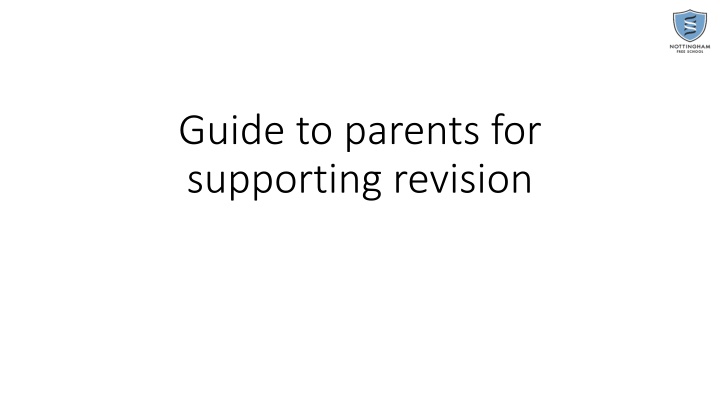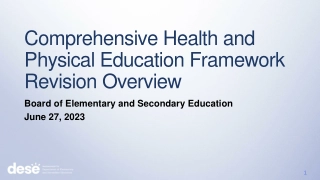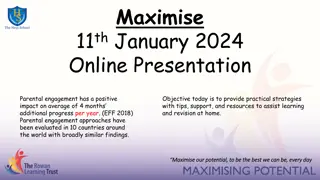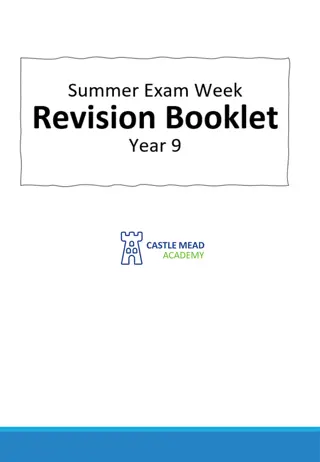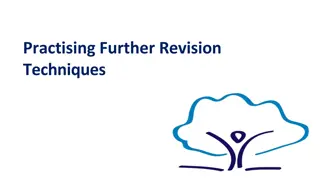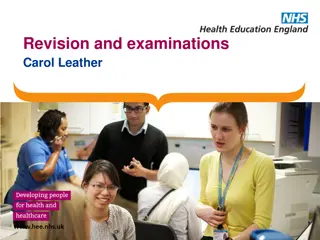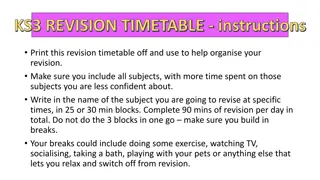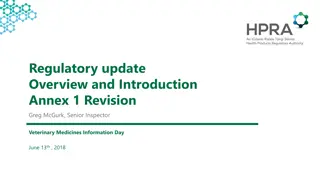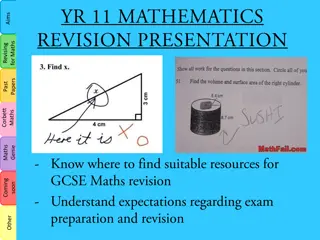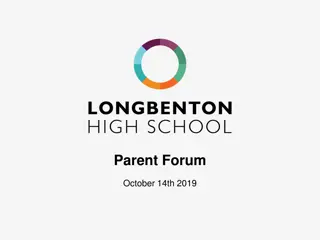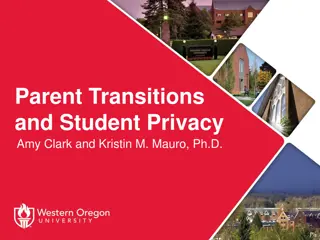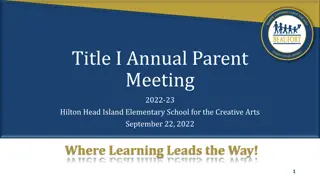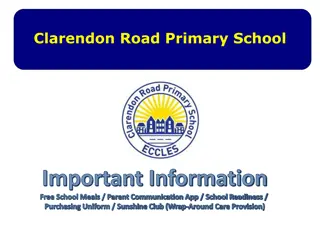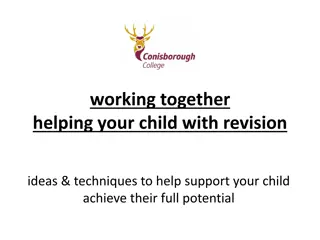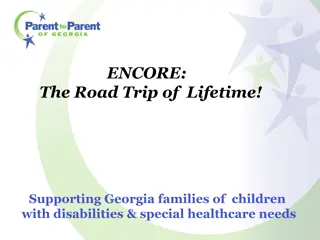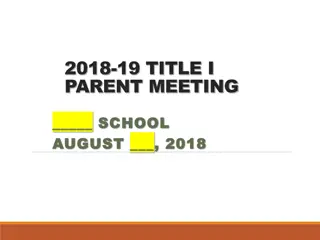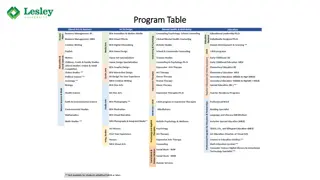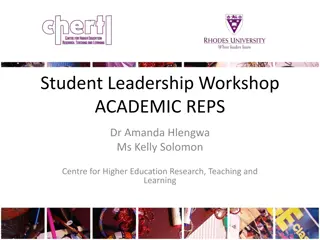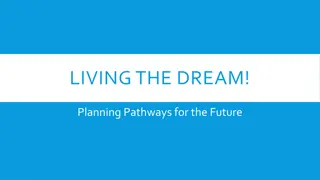Parent's Guide for Supporting Academic Revision
Guide to helping parents support their children in English, Mathematics, and Science revision for exams. Encourages reading, fact memorization, and practice. Provides tips, resources, and strategies to assist students in their academic studies.
Uploaded on Mar 01, 2025 | 2 Views
Download Presentation

Please find below an Image/Link to download the presentation.
The content on the website is provided AS IS for your information and personal use only. It may not be sold, licensed, or shared on other websites without obtaining consent from the author.If you encounter any issues during the download, it is possible that the publisher has removed the file from their server.
You are allowed to download the files provided on this website for personal or commercial use, subject to the condition that they are used lawfully. All files are the property of their respective owners.
The content on the website is provided AS IS for your information and personal use only. It may not be sold, licensed, or shared on other websites without obtaining consent from the author.
E N D
Presentation Transcript
Guide to parents for supporting revision
English How you can support your child Key information Course title and code: AQA English Language Encouraging them to read at home. This should be from a variety of texts, for example, newspapers, fiction, factual books. Assessment: All the information on each novel can be found in: Paper 1: Explorations in Creative Reading and Writing 50% of GCSE Paper 2: Writers' Viewpoints and Perspectives 50% of GCSE www.sparknotes.com. Type in the name of the novel and look at each point in the menu for notes on: context, summary, characters and analysis of each chapter. You can also complete quizzes and do practice study questions. Outline: The GCSE course is a seamless transition from the Key Stage 3 course already studied; it will further develop and deepen the skills and understanding already built up over the last two years. Each of the units are based around one literature fiction text and descriptive or narrative writing. Use BBC Bitesize www.bbc.co.uk/education And choose GCSE English Literature 19th century prose A Christmas Carol or Jekyll and Hyde. You can read revision notes, watch a short video clip and take a quiz on: the plot summary, characters, themes, structure and language. There are also sample exam questions to practise.
Mathematics How you can support your child Key information There are a lot of facts to memorise within mathematics; from rules for finding areas to information about perpendicular gradients for example. Course title and code: AQA Mathematics 8300 Assessment: 100% examination; consisting of 3 exams each 1 hour 30 minutes long. The first paper is non calculator followed by 2 separate calculator papers. Students will either sit a foundation paper covering grades 1-5 or a higher paper covering grades 4-9. Once these facts are learnt then it is key students practice applying them. Questions can be straight forward where it is explicit as to the fact and method they should use. Find the area of a rectangle with length 3cm and width 8cm. Outline: The GCSE course is a seamless transition from the Key Stage 3 course already studied; it will further develop and deepen the skills and understanding already built up over the last two years. Each of the units are based around topics from the core areas of number, algebra, proportional reasoning, geometry, probability and statistics. Or a question can being wordier and more problem solving where the mathematics required maybe hidden among lots of other information. Sarah is going to returf her lawn. She can buy turf in strips of 30cm by 100cm. Her garden is 3m by 8m. How many strips of turf will Sarah need to buy? Help your child to memorise the facts, learn how to break questions down and then practice, practice, practice applying their knowledge to different types of questions.
Science How you can support your child Key information We offer two science courses at Nottingham Free School: Triple and Trilogy science. Triple is split up into three subjects: Biology, Chemistry and Physics and the pupils will be awarded a grade for each. This is the route followed by the a band. Pupils have 9 lessons per week. Trilogy is also split into Biology, Physics and Chemistry but pupils will be awarded two science grades rather than 3. This is the route followed by the B band. Pupils have 6 lessons per week. For all routes pupils will be able to achieve grades 1-9. In Physics pupils are expected to learn 23 equations and be able to use a further 12 given in an information sheet. Over the next three years we will cover a lot of content and there are many facts that your child needs to know. To help you can: Ensure pupils regularly review the work covered in lessons. Support your child to make a bank of flash cards of the information they need to know and test them regularly. Purchase revision guides from the school and encourage them to read over information covered in lessons and answer the questions. Practice exam style questions when revising and help your child to mark these following the mark scheme. Ask your child if they have understood what they have covered in class by getting them to explain concepts to you. If they can t then encourage them to see the teacher before too much time has passed.
PE How you can support your child Key Information Practical PE All students should be participating in as much sport (preferably competitive sport) as they can. Their practical scores in sports are worth nearly 1/3 of their mark so it is crucial that they are participating in sport outside of school. The single practical lesson is not solely enough for them to be assessed practically. About the GCSE PE course: 2 exams at the end of Year 11 (60% of final mark) Controlled assessment in Year 10 (10% of final mark) Students will be assessed on their 3 strongest sports both as an individual and part of a team (30% of final mark) Students currently have a double theory lesson and a single practical lesson Theoretical PE Revision Guide: There is no specific OCR guide yet, but if you would like one in the meantime there is GCSE Physical Education: All-in-one Revision and Practice (Collins GCSE Revision and Practice: New 2016 Curriculum) or the CGP New GCSE Physical Education Revision Guide Text Book (Consolidation): Accredited by OCR is OCR GCSE (9-1) PE Second Edition Useful Websites: revisionworld.com / BBC Bitesize / S-COOL Please also encourage students to complete their weekly homework this is always placed on INSIGHT Course Contents: Factors that underpin physical activity and how to use this to improve performance Physiological and psychological factors that affect performance in physical activity and sport Analysis and evaluation to improve performance in physical activity and sport The contribution which physical activity and sport make to health, fitness and well-being The key socio-cultural influences which can affect people s involvement in physical activity and sport.
Philosophy and Ethics Core Short Course GCSE How you can support your child Key information Know the content of the syllabus and help them plan revision. There are 2 parts to this course. Each component is examined separately. You will have 2 x 1 hour 45 minute exams. Each exam is 50% of the final grade. Help students learn key terms for Islam and Christianity. Test on key terms. What do they study? Learn key teachings for Islam and Christianity. Component 1: The study of 2 religions beliefs, teachings and practices. Christianity and Islam Test on teachings. Encourage students to think about alternative points of view. Component 2: 4 thematic studies Relationships and families Religion Peace and conflict Crime and punishment Religion and life Religion, human rights and social justice and families Discuss key issues. Purchase a textbook. Look at the exam board website for past papers and go through these with them.
Philosophy and Ethics Full Course GCSE How you can support your child Key information Know the content of the syllabus and help them plan revision. At Nottingham Free School students will study a religious studies course that will result in a qualification worth GCSE. There are 2 parts to this course. Each component is examined in one exam. Students will have 1 x 1 hour 45 minute exam. Help students learn key terms for Islam and Christianity. Test on key terms. Learn key teachings for Islam and Christianity. What do they study? Test on teachings. Encourage students to think about alternative points of view. Component 1: The study of 2 religions Christian and Muslim beliefs and teachings Discuss key issues. Component 2: 2 thematic studies Peace and Conflict Relationships and Families Peace and Conflict: Christian teachings about war, peace, terrorism, forgiveness and reconciliation. Purchase a textbook. Look at the exam board website for past papers and go through these with them. Relationships and Families: Christian teachings about
Design Technology How you can support your child Key information Useful websites: Design and Technology http://www.technologystudent.com/ The exam board that we will follow is AQA. http://www.bbc.co.uk/schools/gcsebitesize/design/ The course is split into: It would be useful for students to purchase a copy of: 50% Controlled assessment https://www.cgpbooks.co.uk/School/books_gcse_dt_pr oduct.book_TPAW42 50% exam These are available to order tonight.
Food Nutrition and Preparation How you can support your child Key information Paper 1: Food preparation and nutrition Encourage your son/daughter to contribute when cooking at home What's assessed Theoretical knowledge of food preparation and nutrition from Sections 1 to 5. Students should be exposed to a range of ingredients and should have the opportunity to visit farm shops, large supermarkets or specialist food shops How it's assessed Written exam: 1 hour 45 minutes 100 marks 50% of GCSE Ensure that your son/daughter has given you their ingredient list a week in advance of their practical activity Questions Multiple choice questions (20 marks) Five questions each with a number of sub questions (80 marks) There will be a practical every other Monday so they students should have weighed out their ingredients on the Sunday night. They should not chop any ingredients as this needs to be done within the classroom as part of the practical Non-exam assessment (NEA) How it's assessed Task 1: Written or electronic report (1,500 2,000 words) including photographic evidence of the practical investigation. Task 2: Written or electronic portfolio including photographic evidence. Photographic evidence of the three final dishes must be included. Students should have named containers with them so that they are able to take home food that they have produced http://www.foodafactoflife.org.uk/ is a website which contains many resources and activities for students to complete at home. Students should be guided towards the 11-16 section
History How you can support your child Key information The GCSE course has four main elements: * The Norman Conquest: the impact and legacy of William the Conqueror s invasion of England in 1066. * Medicine Through Time: the development of medicine from the medieval period to the present. * Germany 1890-1945, which looks at the Kaiser, World War I, the inter-war years and the Nazi party. * The Cold War 1945-1972, looking at key flashpoints of the Cold War era and their impact. Encourage them to revise and discuss the materials they have gone through in class. Practice key terms, definitions and spellings with them. Purchase a text book for use at home. Useful websites for the first unit Norman Conquest 1066- 1100 : For internal examinations, students will be provided with a revision booklet, with relevant tasks to help them learn, and a set of topics to memorise. www.bbc.co.uk/history/british/normans http://www.historyonthenet.com/normans/whowere.htm http://spartacus-educational.com/Normans.htm http://normans.etrusia.co.uk/ The textbook Norman England: 1066-1100 for AQA GCSE History, by Helena Clarke is a useful companion to the course.
Geography How you can support your child Key information Course title and code: AQA Geography Assessment: 100% examination; consisting of 3 exams each 1 hour 30 minutes long. There are a lot of facts to memorise within Geography; from case study information to locations of countries, this course is packed full of information to memorise. Paper 1 : Living with the physical environment Paper 2: Challenges in the human environment Paper 3: Geographical applications Once these facts are learnt then it is key that students practice applying them. Outline: The GCSE course is a seamless transition from the Key Stage 3 course already studied; it will further develop and deepen the skills and understanding already built up over the last two years. Help your child to memorise the facts, learn how to break questions down and then practice, practice, practice applying their knowledge to different types of questions.
